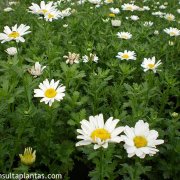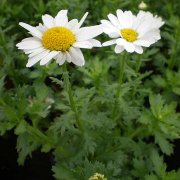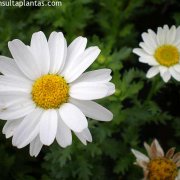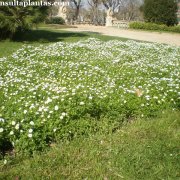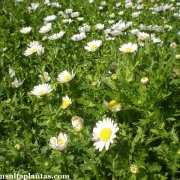Care of the plant Leucanthemum paludosum or Creeping daisy |
|
The genus Leucanthemum, family Asteraceae, comprises 70 species of herbaceous plants native to Europe, Asia and North Africa. Some species are: Leucanthemum paludosum, Leucanthemum nipponicum, Leucanthemum vulgare, Leucanthemum praecox. Common names: Mini marguerite, Creeping daisy, Paludosum daisy. This species is native to northern Africa. They are annual herbaceous plants that reach 30 cm (11.8") in height. They have lobed leaves of deep green color. The showy and abundant white flowers with a yellow center look like little daisies. They can bloom from late winter to late spring. Creeping daisy is used as annual plants in borders, in flowerbeds, in rockery, to cover slopes and in pots for balconies, terraces and patios. It combines well with plants of the Iris, Teucrium, Arctotis and Agathea genus. It's very suitable for Mediterranean coastal gardens. Leucanthemum paludosum prefers full sun exposure and a temperate or warm climate. It resists occasional frosts down to -5 ºC (23 ºF). The soil can be a well-drained garden substrate with coarse sand; Creeping daisy grows in calcareous and poor soils. Planting or transplanting is done in early spring. Water regularly, without ever flooding, waiting until the substrate has dried almost completely; Paludosum daisy has some tolerance to drought. Mini marguerite does not need pruning or fertilizers. Leucanthemum paludosum is a plant resistant to pests and diseases but sensitive to excess humidity. Creeping daisy propagates in spring by division; It's usually grown as annuals, so each year the specimens are renewed. |
Images of the plant Leucanthemum paludosum or Creeping daisy |
Find plants
Leucanthemum paludosum or Creeping daisy | Care and Growing
© 2026 FavThemes
